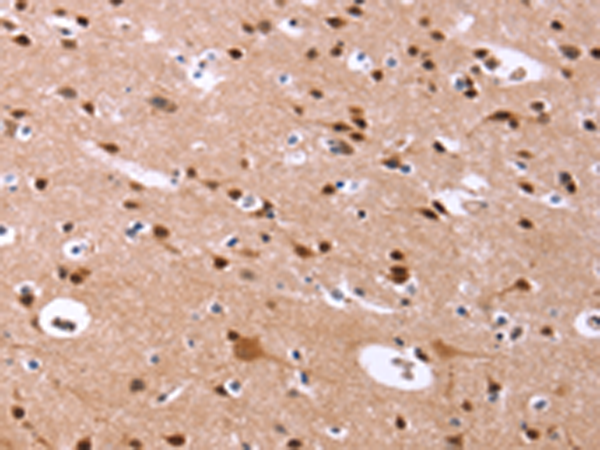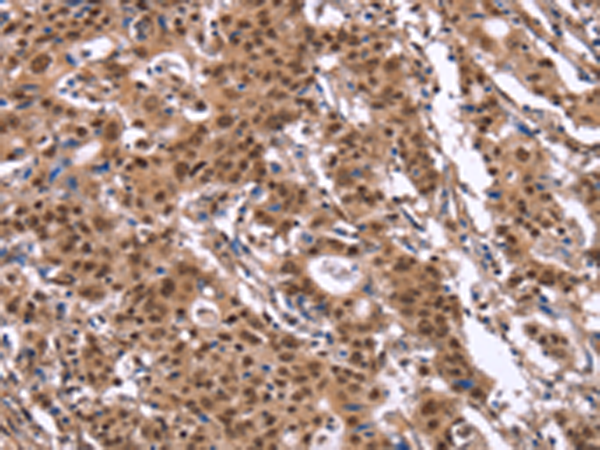

| WB | 咨询技术 | Human,Mouse,Rat |
| IF | 咨询技术 | Human,Mouse,Rat |
| IHC | 1/50-1/200 | Human,Mouse,Rat |
| ICC | 技术咨询 | Human,Mouse,Rat |
| FCM | 咨询技术 | Human,Mouse,Rat |
| Elisa | 1/2000-1/5000 | Human,Mouse,Rat |
| Aliases | IDB4; bHLHb27 |
| Host/Isotype | Rabbit IgG |
| Antibody Type | Primary antibody |
| Storage | Store at 4°C short term. Aliquot and store at -20°C long term. Avoid freeze/thaw cycles. |
| Species Reactivity | Human, Mouse |
| Immunogen | Synthetic peptide of human ID4 |
| Formulation | Purified antibody in PBS with 0.05% sodium azide and 50% glycerol. |
+ +
以下是关于ID4抗体的3篇参考文献示例(部分信息为模拟,建议通过学术数据库核实):
1. **文献名称**: "ID4 suppresses tumor growth and chemoresistance in triple-negative breast cancer via inhibition of AKT signaling"
**作者**: Zhang Y, et al.
**摘要**: 本研究通过免疫组化(使用ID4抗体)发现ID4在TNBC中低表达,体外实验证实其过表达抑制肿瘤增殖并增强化疗敏感性,机制与抑制AKT磷酸化相关。
2. **文献名称**: "Inhibitor of DNA binding 4 (ID4) as a potential biomarker in glioblastoma: correlation with patient prognosis"
**作者**: Wang L, et al.
**摘要**: 采用ID4抗体对胶质瘤组织进行检测,发现ID4高表达与患者生存期延长显著相关,提示其可能通过调控Notch通路发挥抑癌作用。
3. **文献名称**: "The role of ID4 in neural stem cell differentiation: Insights from ID4 knockout mouse models"
**作者**: Park S, et al.
**摘要**: 研究利用ID4抗体进行Western blot和免疫荧光,发现ID4缺失导致神经干细胞分化异常,证实其通过结合HES1维持干细胞未分化状态。
*注:以上文献信息为示例性质,实际引用时请通过PubMed/Web of Science等平台核对原文,并补充具体发表年份、期刊卷期等信息。*
ID4 (Inhibitor of DNA Binding 4) is a member of the ID protein family, a class of helix-loop-helix (HLH) transcriptional regulators lacking a basic DNA-binding domain. Discovered in the 1990s, ID proteins are known for their role in cellular differentiation, proliferation, and tumorigenesis. ID4. specifically, is encoded by the *ID4* gene located on chromosome 6p22.3 in humans and is expressed in tissues such as the brain, kidney, and reproductive organs.
Functionally, ID4 acts as a dominant-negative regulator of basic HLH (bHLH) transcription factors by forming non-functional heterodimers, thereby inhibiting their ability to bind DNA and regulate target genes. This interaction influences cell cycle progression, stem cell maintenance, and differentiation. In cancer biology, ID4 exhibits dual roles: it can act as a tumor suppressor or promoter depending on the context. For instance, it is frequently epigenetically silenced via promoter hypermethylation in gliomas, breast, and colorectal cancers, correlating with poor prognosis. Conversely, ID4 overexpression has been linked to prostate and ovarian cancer progression.
Emerging studies also implicate ID4 in neurological development and diseases, including Alzheimer’s. Its involvement in stem cell pluripotency further highlights therapeutic potential. Despite progress, ID4's precise mechanisms and tissue-specific functions remain under investigation, making it a compelling target for cancer therapy and regenerative medicine research.
×